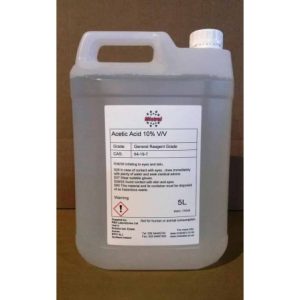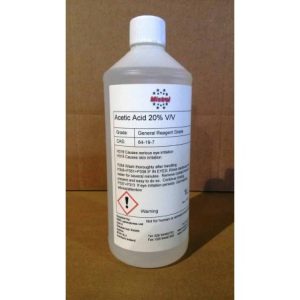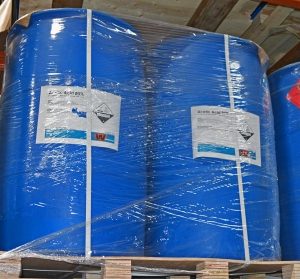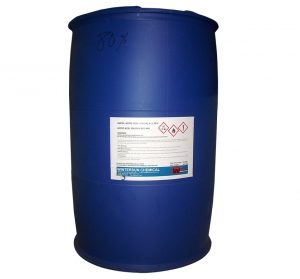Uncategorized
The Versatile Power of Acetic Acid
LIQUID CHEMICALS
Acetic acid, a highly versatile compound, has proven its worth across various industries, showcasing its immense potential and significance. Its applications range from the food and beverage industry to medical and pharmaceutical uses, household benefits, and industrial processes.
With acetic acid playing a pivotal role in food preservation, wound treatment, cleaning, and manufacturing, it has become an indispensable asset in these domains. However, its versatility doesn’t stop there; acetic acid finds its place in research and testing as well.
In this discussion, we will explore the multifaceted power of acetic acid and its diverse applications, highlighting its importance in different fields.
Key Takeaways
- Acetic acid, found in vinegar, plays a major role in the food and beverage industry as a key ingredient in condiments, preserving food, controlling bacteria in seafood recipes, and as a byproduct of certain food processing steps.
- In the medical and pharmaceutical field, vinegar has traditional uses in wound treatment and infections, serves as a chemical reagent in pharmaceutical manufacturing, helps maintain pH balance in various products, and is an alternative to antibiotics for certain skin infections. It also has diagnostic uses in screening for cervical and gastric cancers.
- Vinegar has various household applications, including cleaning toilet bowls and ceramic tiles, removing rust stains and hard water deposits, preventing mold growth in wooden wardrobes, and acting as a bug repellent for ants, mosquitoes, and cockroaches. It is also present in numerous household items and cosmetic products.
- In industrial applications, acetic acid is essential in the production of vinyl acetate monomers, which are used in manufacturing polymers, plastics, paints, and adhesives. It contributes to a significant portion of global acetic acid consumption and serves as a precursor for producing polyvinyl acetate, ethylene-vinyl acetate copolymers, and polyvinyl alcohol. Additionally, acetic acid is used to produce various synthetic products.
Food and Beverage Industry Uses
The food and beverage industry heavily relies on the versatile power of acetic acid in various applications.
One major use of acetic acid in this industry is as a key ingredient in condiments, particularly vinegar. Vinegar adds a tangy flavor to a wide range of dishes and is commonly used in salad dressings, marinades, and sauces.
Acetic acid also plays a crucial role in preserving and extending the shelf life of various food products. It acts as a natural antimicrobial agent, inhibiting the growth of bacteria and other unwanted microbes.
Additionally, acetic acid is used in seafood recipes for bacterial control, ensuring the safety and quality of the final product. Its ability to inhibit unwanted microbes is also utilized in cocoa fermentation, a critical step in chocolate production.
Medical and Pharmaceutical Applications
Acetic acid demonstrates its versatility in the field of medicine and pharmaceuticals through its various applications and benefits. Here are four ways in which acetic acid is utilized in this industry:
- Traditional use in wound treatment and infections: Acetic acid has been used for centuries as a natural remedy for treating wounds and infections. Its antimicrobial properties help prevent the growth of bacteria and promote healing.
- Chemical reagent in pharmaceutical manufacturing: Acetic acid serves as a crucial chemical reagent in the production of various pharmaceutical drugs. It is used in the synthesis of active pharmaceutical ingredients and plays a vital role in drug formulation.
- pH balance maintenance: Acetic acid is used in the pharmaceutical industry to maintain the pH balance of various products. It helps stabilize formulations and ensure their efficacy and safety.
- Alternative to antibiotics for certain skin infections: Acetic acid has been found to be effective in treating certain skin infections, such as fungal infections and acne. Its antimicrobial properties make it a viable alternative to antibiotics, reducing the risk of antibiotic resistance.
Household Benefits
Household applications of acetic acid encompass a wide range of practical uses for maintaining cleanliness and preventing common household issues. Acetic acid, commonly found in vinegar, has been used for centuries as a cleaning agent and natural disinfectant. Its acidic properties make it effective in removing rust stains, hard water deposits, and mold growth in wooden wardrobes. Additionally, acetic acid can be used as a bug repellent for ants, mosquitoes, and cockroaches. It is also present in various household items and cosmetic products. To showcase the household benefits of acetic acid, the following table highlights some of its key applications:
| Household Application | Description |
|---|---|
| Cleaning Toilet Bowls | Effectively removes stains and disinfects toilet bowls |
| Removing Rust Stains | Breaks down rust and helps remove stains from surfaces |
| Preventing Mold Growth | Inhibits the growth of mold in wooden wardrobes and other damp areas |
| Bug Repellent | Acts as a natural insect repellent, keeping ants, mosquitoes, and cockroaches away |
| Household Items and Cosmetics | Found in various household items, such as cleaning products and cosmetics |
With its versatile properties, acetic acid proves to be a valuable tool in maintaining cleanliness and preventing household issues.
Industrial Applications
Acetic acid finds extensive use in various industries, ranging from the production of vinyl acetate monomers to the manufacturing of polymers, plastics, paints, and adhesives. Its versatility in industrial applications is evident through the following:
- Essential role in the production of vinyl acetate monomers, which are crucial in the manufacturing of polymers, plastics, paints, and adhesives.
- Contribution to a third of the global consumption of acetic acid, highlighting its widespread use in industrial processes.
- Act as a precursor in the production of polyvinyl acetate, ethylene-vinyl acetate copolymers, and polyvinyl alcohol, which are widely used in various industries.
- Wide range of synthetic products derived from acetic acid, making it a valuable component in the development of innovative materials.
The industrial applications of acetic acid highlight its importance as a versatile chemical compound that is indispensable in various manufacturing processes.
Versatility in Other Fields
With its wide range of applications in various industries and fields, acetic acid has proven to be an incredibly versatile compound. Apart from its industrial uses, acetic acid finds its place in other fields as well. In the food and beverage industry, vinegar, a major ingredient in condiments, is derived from acetic acid. It is also used for food preservation, bacterial control in seafood recipes, and inhibiting unwanted microbes in cocoa fermentation. In the medical and pharmaceutical field, acetic acid is used in wound treatment, pH balance maintenance, and even as an alternative to antibiotics for certain skin infections. In households, acetic acid is used for cleaning purposes, as a bug repellent, and is present in various household items and cosmetic products. The versatility of acetic acid extends to its use as a laboratory reagent, cleaning agent, food preservative, and in the manufacture of various chemicals.
| Field | Applications |
|---|---|
| Food and Beverage | – Vinegar as a major ingredient in condiments |
| – Preservation and shelf-life extension of food | |
| – Use of vinegar in seafood recipes for bacterial control | |
| – Acetic acid production as a byproduct in certain food processing steps | |
| – Inhibition of unwanted microbes in cocoa fermentation | |
| Medical and | – Traditional use of vinegar for wound treatment and infections |
| Pharmaceutical Uses | – Chemical reagent in pharmaceutical manufacturing |
| – Maintenance of pH balance in various products | |
| – Alternative to antibiotics for certain skin infections | |
| – Diagnostic use in screening for cervical cancer and detecting gastric cancers | |
| Household | – Cleaning toilet bowls and ceramic tiles |
| Applications | – Removing rust stains and hard water deposits |
| – Prevention of mold growth in wooden wardrobes | |
| – Use as a bug repellent for ants, mosquitoes, cockroaches, etc. | |
| – Presence in various household items and cosmetic products | |
| Industrial | – Essential role in the production of vinyl acetate monomers |
| Applications | – Use of monomers in manufacturing polymers, plastics, paints, and adhesives |
| – Contribution to a third of global consumption of acetic acid | |
| – Precursor in the production of polyvinyl acetate, ethylene-vinyl acetate copolymers, and PVA | |
| – Wide range of synthetic products derived from acetic acid | |
| Other Uses | – Laboratory reagent for pH adjustment |
| – Cleaning agent for mineral deposits and rust | |
| – Food preservation and flavoring agent | |
| – Manufacture of various chemicals, such as vinyl acetate monomer | |
| – Production of vinegar |
Vinegar as a Key Ingredient
Vinegar, a key ingredient in various culinary creations, plays a crucial role in enhancing the flavors and preserving the quality of food. Here are four reasons why vinegar is a valuable addition to your kitchen:
- Flavor enhancement: Vinegar adds a tangy and acidic taste to dishes, balancing out flavors and giving them a delightful kick.
- Food preservation: The acetic acid in vinegar acts as a natural preservative, inhibiting the growth of bacteria and extending the shelf-life of food.
- Tenderizing meat: The acidic properties of vinegar help break down tough proteins in meat, making it more tender and juicy.
- Dressings and marinades: Vinegar is a key component in dressings and marinades, adding depth and complexity to salads, vegetables, and meats.
From enhancing the taste of your favorite dishes to keeping your food fresh for longer, vinegar truly is a versatile and essential ingredient in any kitchen.
Acetic Acid in Food Preservation
The use of vinegar as a natural preservative extends beyond its role as a key ingredient in culinary creations, particularly in food preservation. Acetic acid, the main component of vinegar, has been used for centuries to inhibit the growth of harmful bacteria and prolong the shelf life of various food products. Its antimicrobial properties make it an effective option for preserving fruits, vegetables, pickles, and even meat. Acetic acid works by creating an acidic environment that inhibits the growth of bacteria, yeast, and molds. Additionally, it can enhance the flavor of preserved foods, adding a tangy and distinct taste. Acetic acid has proven to be a versatile and reliable tool in food preservation, ensuring that our favorite dishes stay fresh for longer.
| Food Preserved | Method of Preservation | Acetic Acid Concentration |
|---|---|---|
| Pickles | Fermentation | 5-8% |
| Canned Vegetables | Acidification | 2-5% |
| Sauces | Acidification | 2-4% |
| Jams and Jellies | Acidification | 1-3% |
| Meat | Brining | 1-2% |
Acetic Acid in Cleaning and Maintenance
Acetic acid is widely recognized for its effectiveness in various cleaning and maintenance applications. Here are four key ways in which acetic acid can be used for cleaning and maintenance:
- Removing stains: Acetic acid is a powerful stain remover, particularly for rust stains and hard water deposits. It can be used to clean toilet bowls, ceramic tiles, and other surfaces.
- Preventing mold growth: Acetic acid is an effective mold inhibitor. It can be used to prevent mold growth in wooden wardrobes, bathrooms, and other areas prone to moisture.
- Repelling pests: Acetic acid can serve as a natural bug repellent for ants, mosquitoes, cockroaches, and other pests. It can be used as a non-toxic alternative to chemical insecticides.
- Cleaning household items: Acetic acid is present in various household cleaning products. It can be used to clean and disinfect surfaces, appliances, and kitchen utensils.
With its versatile cleaning properties, acetic acid is a valuable tool for maintaining cleanliness and hygiene in various settings.
Acetic Acid in Manufacturing
In addition to its wide range of applications in cleaning and maintenance, acetic acid also plays a crucial role in various manufacturing processes. One of its key uses is in the production of vinyl acetate monomers, which are essential in the manufacturing of polymers, plastics, paints, and adhesives.
Acetic acid contributes to a significant portion of global consumption and acts as a precursor in the production of polyvinyl acetate, ethylene-vinyl acetate copolymers, and polyvinyl alcohol. Furthermore, acetic acid is utilized in the manufacturing of various synthetic products derived from its chemical properties.
Its versatility and effectiveness make it an indispensable component in the manufacturing industry, highlighting the importance of acetic acid in the production of a wide range of products.
Acetic Acid in Research and Testing
Research and testing have revealed the extensive potential of acetic acid across a wide range of scientific fields and industries. Here are four notable applications of acetic acid in research and testing:
- Chemical analysis: Acetic acid is commonly used as a laboratory reagent for pH adjustment. Its acidic properties make it useful in various analytical techniques, such as titration and spectrophotometry.
- Biological research: Acetic acid is utilized in the study of cellular processes and genetics. It is a component of certain fixatives used in histology and microscopy, aiding in the preservation and staining of specimens.
- Environmental monitoring: Acetic acid is employed for monitoring air quality and pollution levels. Its presence can indicate the presence of industrial emissions or organic compounds in the environment.
- Quality control: Acetic acid is used in testing and quality control processes for various products, including food, beverages, pharmaceuticals, and cosmetics. It helps ensure the safety and consistency of these products before they reach the market.
These applications demonstrate the versatility and importance of acetic acid in advancing scientific knowledge and ensuring the quality of various goods and services.




